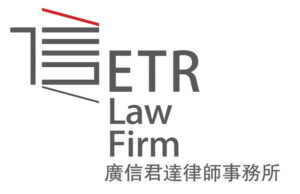Shareholding entrustment is of obvious positive significance for optimizing resource allocation, which helps investors achieve their investment objectives, enables companies to obtain financial support for development, stimulates management efficiency, and protects investors’ personal privacy. However, shareholding entrustment also brings challenges to the characters based on shareholders of limited liability companies.

ETR Law Firm
Associate
At the same time, the protection of the rights and interests of registered shareholders and anonymous shareholders also faces certain risks. The series of problems related to shareholding entrustment are attracting investor attention in commercial activities in the newly designated Greater Bay Area (GBA). Therefore, the authors have studied the disputes related to the shareholding entrustment agreement in judicial practice, and here summarize some judicial adjudication rules.
In the five years from 2014 to 2018, the total number of disputes related to shareholding entrustment reached 3,891 across China, showing an overall upward trend. Taking the year 2018 as the retrieval period, it can be found that the total number of disputes related to shareholding entrustment concluded by courts at all levels in China was 1,329, of which 638 were disputes related to companies. In the shareholding entrustment disputes related to companies, the confirmation of shareholders’ qualifications and the transfer of equity were the two most prominent problems, accounting for 38% and 39% of cases, respectively.
In previous trials of shareholding entrustment disputes, when the court determined whether the shareholding entrustment agreement signed between the actual investor and the nominal shareholder was valid, as long as the contract did not violate the mandatory provisions of laws and administrative regulations, it would generally decide that the shareholding entrustment agreement was valid.
This logic leads some investors to choose shareholding entrustment to avoid investment restrictions in certain industries, such as shareholding entrustment of insurance companies. However, in recent years, the Supreme People’s Court’s judgments show that it is changing its decisions on the validity of the shareholding entrustment agreement; if the content of the shareholding entrustment contract involves damage to the public interest, the court directly denies its validity.
Related cases include the Fuzhou Tiance Industrial Co Ltd v Fujian Weijie Investment Co Ltd business trust dispute, and the equity transfer dispute, Yang Jinguo v Lin Jinkun, which were tried by the Supreme Court in 2017. From these, we can determine the following facts: (1) the shareholding entrustment agreement may be invalid even if it only violates departmental regulations or other non-mandatory legal provisions; (2) the risk that shareholding entrustment agreements involving financial security and public interests may be invalid is greatly increased; and (3) the company to be listed must strengthen the clearing and standardization of the shareholding entrustment relationship in advance.
Another issue worthy of attention is the validity of the shareholding entrustment agreement signed by civil servants, which has been recognized as valid by several court judgments. Article 14 of the Interpretation of Contract Law (II) points out that “mandatory provisions” in the circumstances that invalidate a contract, as set out in article 52(5) of the Contract Law, refer to mandatory provisions on validity.
However, the provision of article 53(14) of the Civil Service Law, that civil servants shall not “engage in or participate in profit-making activities and hold concurrent posts in enterprises or other profit-making organizations”, is a regulatory prohibitive norm, and is related to the “market access” qualification of the parties concerned. One purpose of this kind of norm is that specific administrative authorities perform their administrative functions according to law, to maintain social order. Therefore, if a civil servant violates this norm, he/she should be held accountable by an administrative authority, but this does not affect the validity of the contract.
For anonymous shareholders, the core issues related to their shareholders’ rights and interests are equity confirmation and shareholder identification. In judicial practice, the court judgment tends to apply the double standard of “difference between inside and outside of the company”. For the inside of the company, the court pays more attention to the substantive elements, while for the outside of the company, especially when a bona fide third party is involved, the court focuses on the formal elements.
First, regarding the issue of equity confirmation, whether the actual investor is registered with the industrial and commercial authority has little influence on the confirmation of his/her equity. The most fundamental basis for the court’s decision is whether the parties to the contract have expressed their intention for shareholding entrustment. Specifically, it requires two elements – one is a written contract, and the other is the actual investment.
Second, regarding the determination of a shareholder’s qualification, according to the principle of privity, when the actual investor and the nominal shareholder sign the shareholding entrustment agreement they can certainly agree on the rights and obligations of both parties, such as agreeing on the time and method of distributing dividends, and the exercise of voting rights, etc. However, the agreement only binds the parties signing the contract, and does not have an effect automatically on the company. Therefore, after the actual investor has a dispute with the nominal shareholder over the shareholding entrustment contract, and intends to receive dividends, it needs evidence to prove that the company paid dividends to the anonymous shareholder.
In the external relationship between shareholders and third parties other than the company, the court judgment generally adheres to the principle of “commercial appearance”, that is, when the shareholders registered with the industrial and commercial authority is inconsistent with the actual investors, priority will be given to protecting the effectiveness of acts made by bona fide third parties out of their trust in the registration of the company registration authority.
The most common dispute is that creditors of nominal shareholders apply for compulsory execution of the latter’s shares, while anonymous shareholders do not have the right to exclude such compulsory execution. In accordance with the principle of “commercial appearance”, the appearance of rights reflected in relevant publicity leads to the third party’s trust in the appearance of rights. Even if the real situation is inconsistent with the third party’s trust, as long as the third party’s trust is reasonable, priority should be given to protect the effectiveness of civil juristic acts of the third party.
Yang Chaonan is an associate at ETR Law Firm. Qin Guoxin, a paralegal at ETR, also contributed to this article.

ETR Law Firm
10 & 29/F, Chow Tai Fook Finance Centre
No. 6 Zhujiang Dong Road, Tianhe District
Guangzhou 510623, China
Tel: +86 20 3718 1333
Fax: +86 20 3718 1388
E-mail:
yangchaonan@etrlawfirm.com
www.etrlawfirm.cn





















